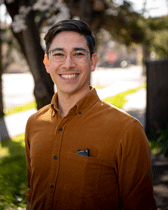Santiago J. Molina
Assistant Professor of Sociology

- santiagojmolina@northwestern.edu
- 1808 Chicago Ave. Room 110
- Office Hours: By appointment only
- Sign up here for office hours.
Area(s) of Interest
Bioethics; Culture; Disability Studies; Medical Sociology and Health; Political Sociology; Qualitative Methodology; Race and Ethnicity; Science, Knowledge/Technology;
Biography
Santiago J. Molina (he/they) grew up moving between the United States and central Mexico. He received his PhD in Sociology from the University of California, Berkeley and his BA from the University of Chicago. Their work sits at the intersections of science and technology studies, political sociology, sociology of racial and ethnic relations, and bioethics. On a theoretical level, Santiago’s work concerns the deeply entangled relationship between the production of knowledge and the production of social order. They are pursuing this line of research through two projects:
The first project, The Biopolitics of Genome Editing, analyzes the institutionalization of CRISPR-Cas technology. Through participant observation, interviews, and archival methods this NSF-funded project seeks to detail how scientists adopt CRISPR into their work and to explain how, when and under what conditions scientists articulate standards of practice that shape what counts as ethical genome editing. Since 2015, Santiago has followed the trajectory of genome editing practices as they travel from the lab bench to the clinic. During his time at Northwestern, Santiago will extend this project to research the racial politics of recruiting patients into genome editing clinical trials for sickle-cell anemia and beta thalassemia.
The second project, Categorical Heterogeneity in Population Genetics and Biomedicine, is concerned with sampling practices and conventions of classification in human biology from the mid-Twentieth Century to the present. This project traces the impact of ‘populationist’ views of human difference on the categorical work of physical anthropologists, genetic epidemiologists and physiologists. In collaboration with The Edmond J. Safra Center for Ethics at Harvard University, Santiago is researching how scientists in different disciplines conceptualize and operationalize human difference through “ancestry” and “population.”
Santiago’s teaching has aimed to cultivate practical tools for thinking critically about the relationship between science and society. They have taught courses on sociological methods, intro to sociology, science and technology studies, and the sociology of illness.
Courses Taught
SOCIOL 101-8 Latinx Futurism
SOCIOL 220-0 Health, Biomedicine, Culture, and Society
SOCIOL 376-0 Sociology of Technology
